Loading...
Joy is a core value at NPR, which is why we have a dedicated space to hear all about your hobbies and passions. This year we've heard stories from quitting your job to sail the Caribbean to the deeper meaning behind food blogging and what Britney Spears taught us about resilience.
We asked you to share what you're really into and why it brings you joy. And nearly 3,000 of you responded! You shared your passions and how you spend your precious free time.
If you need a new hobby, here are a few ideas.
Reader submissions have been edited for clarity and length.
Seeing national parks
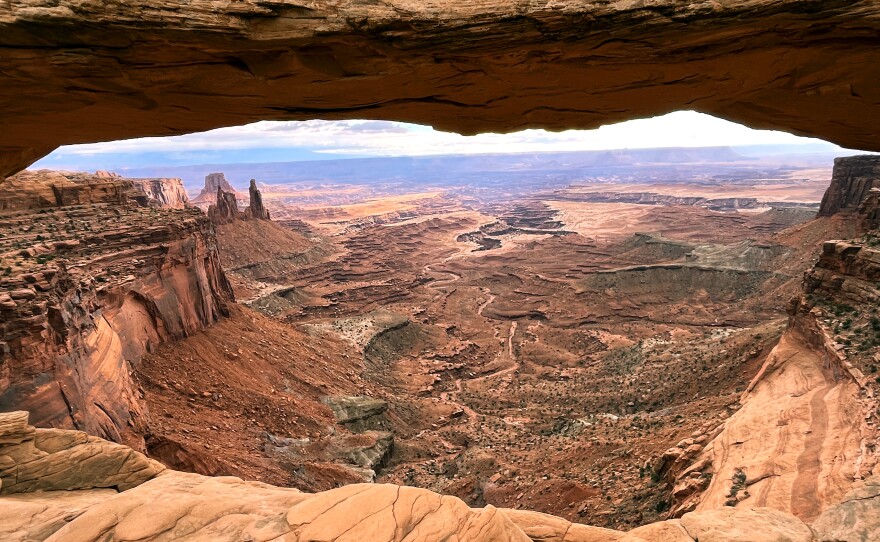
Visiting National Parks became my go-to escape as the pandemic continued. I've since been to a total of 30 Parks, including 4 internationally. I never thought I'd travel this much in the U.S., and I certainly never thought of going overseas to solo hike! National Parks are natural treasures that preserve the greatest beauty this world has to offer.
I've fallen in love with the red rock expanses of Canyonlands, the towering giants of Saguaro, the unmatched wilderness of Big Bend, and the nearly indescribable beauty of the aurora over Denali. These road trips were a means to an end during COVID, but unlocked a new passion and inspired new hobbies.
— Melissa Frennea
Fencing
Fencing is a challenging sport. It might look easy — and honestly, when I first joined, it was. In about a week I was able to beat every kid in the beginner class. But it only stayed easy for a little while. The difficult thing about fencing is the mental demand. I had to learn so many moves, constantly had to keep my posture in check, to guess my opponent's next moves, and correspond accordingly. What made the mental and physical exertion worse was, at one point, every person surrounding me while fencing seemed better than me. They were fast, their posture was perfect, and they could do multiple things at once.
I was on the verge of quitting. I couldn't beat any kid in the advanced class, and I was too embarrassed to fence them. But one day I decided to just watch them. I should have been considering how much they actually practiced. The students weren't born pro fencers — they put in effort every day. They never slacked off. I saw that the only way to overcome a challenge is to have the mindset to do so. Now it's been two years since I joined fencing. Every day, I try. I practice to the best of my abilities. I was able to fence and defeat my first advanced opponent, and I was invited to the advanced class.
Fencing has taught me that challenges can appear anywhere, and you can't just give up. The only way to reach your goal is to face it. Don't quit because you can't do it; try harder and overcome it. Thanks to fencing, I've learned that I'm the only person who can control my life.
— Misheel Tamir
Recycling silk neckties

When I moved to Asheville, N.C., I joined a group of mostly retired women who like to sew and quilt as a hobby. I have always been a recycler and began scouring thrift shops to collect discarded men's neckties. I thought it would be fun to repurpose the silk into unique objects. Well, I am hooked! I started modestly and figured out how to deconstruct the necktie and make a small lightweight shoulder bag to carry some cash and your cellphone to take on walks. Each purse made is very unique, because every necktie is unique. After this discovery, it was obvious that many other things can be made from these gorgeous recycled neckties. This hobby unleashed my inner creativity, and many different types of objects have been made!
It is very special because the discarded ties are finding a new life. Someone gave them away but now the silk is not going to the landfill — it's used in making something very beautiful and practical. Most of my objects that I have made have been given to others. It brings happiness to get a fun, bright, and practical gift!
— Lynne Palmer
Cat'lympics
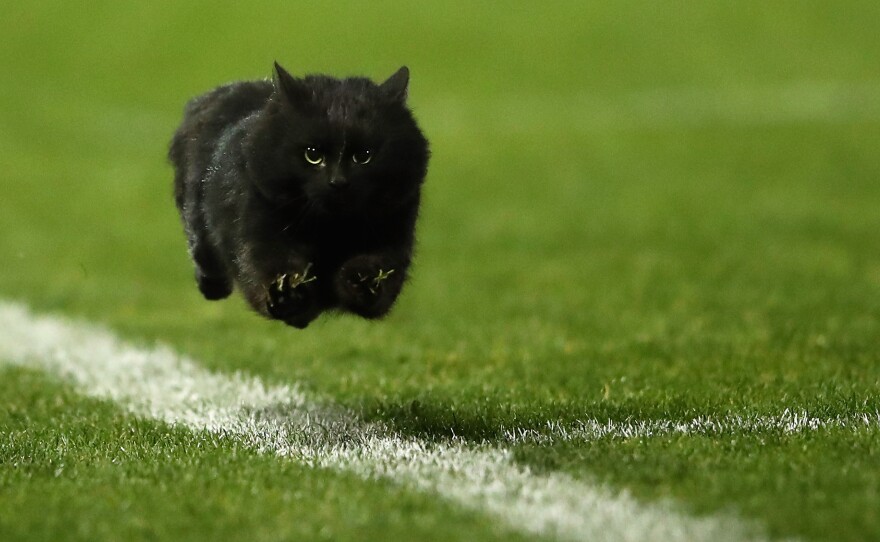
My wife and I created this game called the Cat'lympics. We tell background stories to the history of the games in which each athlete (one of our three cats) will be competing. Typically these games are very much oriented in the interests of cats: how long a cat can lay on one blanket for an entire day; how artistic each cat displays themselves as they leap after a string, creating a choreographed dance; camouflaging; and how well each athlete can chase a ball.
We usually come up with silly names for these events. My favorite part is each story of the athlete and how they came to be an Olympian, and also the stories as to why the Olympics are taking place in a specific place — somehow politics and religion are usually involved, which makes this even sillier. Once all of this is in place, the athletes compete and perform.
This taps into your creativity and a place in your heart and soul that used to exist when you were a child that doesn't get tapped into often enough. Storytelling is also an important skill that I feel is slowly fading, and this creates a space for people to practice that. Plus the whole family is involved, even the pets! Sometimes the Cat'lympics can last for days — especially the blanket-laying event.
— Rosanne Navas
Making pirate hats
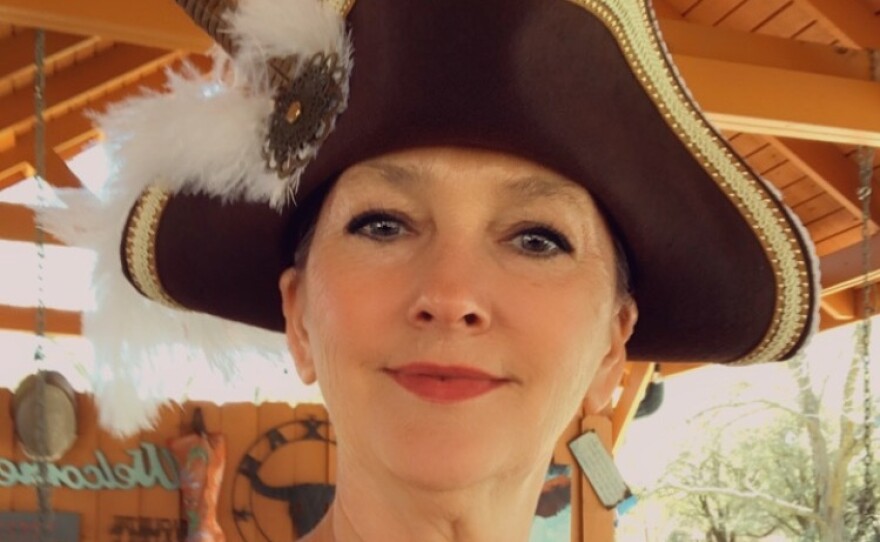
When we were locked up at the beginning of COVID, isolated with too much time on our hands, I had an inordinate amount of stress. For some reason, I found the Hundred Hat Project as a way to cope. I ordered 100 cheap hats, turned them into pirate hats and gave them away to children at Make A Wish and other local organizations. I liked it so much I kept going, and now have an internet store and make hats every week.
It's not about the money. I have a real job, plus I still give away enough hats to eat up any profits, but I feel like everyone needs a pirate hat and it's my mission to outfit everyone I know with a tricorne. Now I have pirate parties twice a year so all my friends have a chance to wear theirs. I can't possibly outfit everyone in a hat, but have written a little booklet so more people can join me in making hats.
— Tamsen Valoir
Small science projects

I used to be a professional experimental physicist. But when life circumstances forced me to put most of my time into other immediate needs, I had to give up my full-time profession in a research laboratory. But I have noticed small science projects in my everyday life, everywhere I look.
For example, one day while I was looking out the window of an airplane, I saw that the groovy eroded mountains of California looked like the fractals I had read about in a math book. I wondered if I could explain the patterns I photographed in the mountains using some of the principles in the book. This project is fairly advanced and somebody else has already done this (synthetic images of mountains have been generated by computers for at least 40 years), but it's still a fun exercise to see how far I could get with it.
I now have a list of over 30 of these small science projects and I am starting to write them up into a book, which I hope will be educational and entertaining for someone else. This hobby of mine keeps me fresh in using my favorite skills, and hopefully sharing them with others.
— Ken Ricci
Pickleball
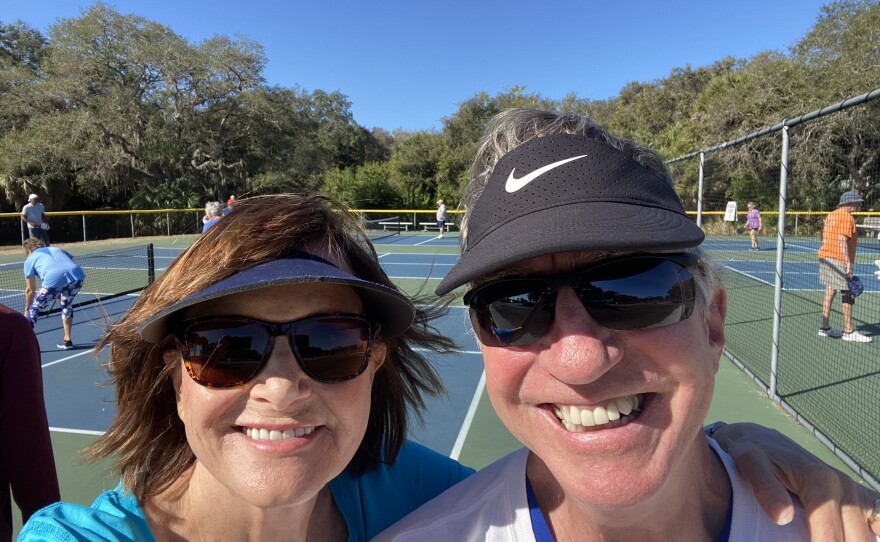
At the ripe old age of 62, I found the first sport of my life. Now I am fully addicted. My father did not allow us to play sports when we were young; we were to strictly focus on studying and exercising our brain, not our body. When my husband and I visited friends that had just bought a home in a retirement development in Arizona, we saw the game for the first time and became very intrigued. When we returned to Kentucky, we started researching whether there were pickleball courts near us. There were! We have been playing actively ever since. I hope I can continue with the sport for years to come.
It is not only fun competition, but it is very social. It literally saved us during COVID that first year! We played outside 4-5 days a week, all year long, even shoveling snow a few times to clear courts. We have made many new friends through pickleball and cherish these new relationships.
It's great fun! It's fabulous exercise. And, it's emotionally uplifting. I have brought many people into the game and no one yet has regretted it.
— Debbie Tuggle
Watercolor and embroidery
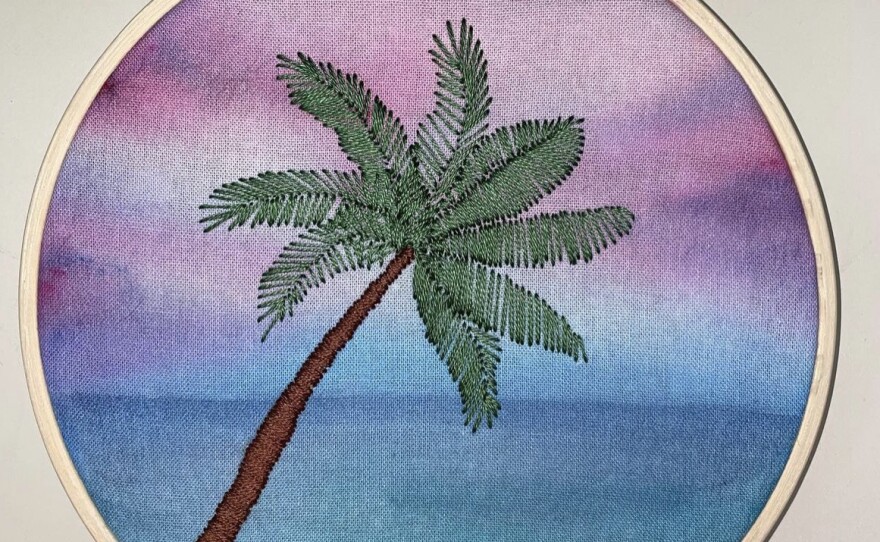
I got into watercolor painting in February of 2020 after seeing people on Instagram painting. I painted two jellyfish and they turned out really well. I was shocked. When the lockdown started just about a month later, it was a perfect pandemic hobby. About two years later, TikTok started pushing embroidery videos my way and I had some of the supplies at home already. I started with embroidering flowers onto the side of a pair of shoes that turned out really cute. Both skills were mostly learned by watching Instagram Reels and TikToks. I've even combined them by painting on fabric, then embroidering over it!
You never know what hidden talent you may have. Plus, creativity is so helpful when the rest of the day feels overwhelming because you have to quiet your mind to focus on the task at hand.
— Amy Tift
American Girl dolls
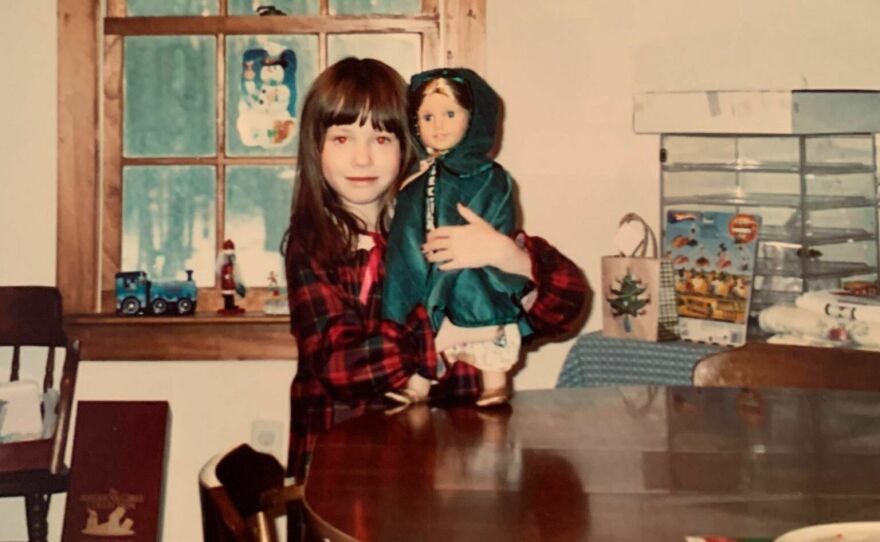
I got my first American Girl doll catalogue when I was 4 years old, before I knew how to read. I was entranced by the exciting scenes made by the dolls, the history and storylines of the characters, and of course, the beautiful and realistic accessories and outfits. I read all of their books through my school's library, and finally was gifted my first doll for Christmas in 2005. My dad is an avid yard sale attendee, and he quickly started picking up American Girl doll lots and groupings from local sales, helping me grow my collection (especially during the recession, and since the dolls new are so expensive).
I always found the historical books to be informative, interesting, and relatable. It showed that no matter what era you were in, girls all faced the same struggles and trials and overcame them.
When I went to college, I started talking to my friends about my American Girl doll collection. It's become a great bonding experience for us to talk about our childhoods, compare our collections, and reminisce over items we loved. Some friends have even helped contribute to my collection!
I think many people lately are interested in healing their inner child, and one of the ways people do that is by picking up their childhood toys again and rediscovering play. Reading the books as an adult can teach you a lot about history and friendship, especially the nonfiction sections. You're never too old to enjoy something that's special to you!
— Jessica Schultz
Making and hosting trivia games
I've been making trivia games — it's not just trivia, but trivia merged with a board game or social game. I've made more than 60 games now, and they are all different. I've always loved trivia, factoids, esoteric, as well as game shows, board games, and Japaneses death game manga (which is just a series of mind games except they have a lethal consequence).
However, the biggest motivator is my general disappointment in bar trivia. Trivia is very white, and as someone who is not white I wanted questions that's more relevant to a diverse audience. I try to make my questions interesting and relevant to most people, not just junk facts.
It brings a lot of joy to my friends who enjoy my trivia games. It brings people together like few other activities do, especially given how isolated people can feel nowadays it's a great activity to get people together on a regular basis. I even have a website for my games now.
— MJ Wu
Woodworking and woodturning
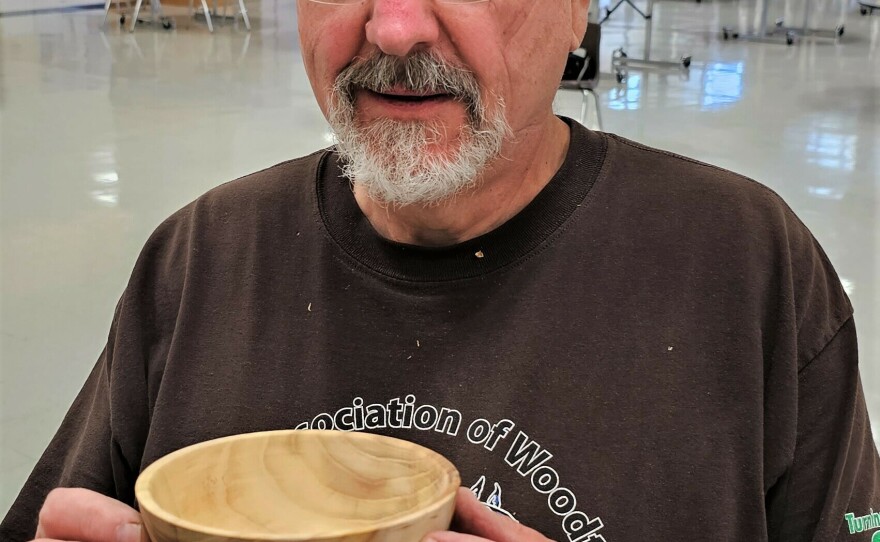
I became interested in woodworking in 1973 while I was employed as a process engineer in Wisconsin. This required daily interactions with the toolmakers for foundry products, and almost all the tooling was made of wood in those days. My role was to tweak the tooling as well as design the plumbing that was present. Any change required some woodworking, and I soon learned all about table saws, band saws, sanders, routers, shapers, lathes, and the myriad of hand tools required by patternmakers.
A few years after this I acquired my first lathe — a gift from a coworker. I've been a woodturner ever since.
Using a ubiquitous material — that literally grows on trees — to make both pragmatic and artistic objects that can simply be termed as just a piece of wood seems to be a natural quest for me. It gives me a permanent reward for the investment of my time and is my artistic outlet in a world where too much time is spent disengaging. My goal is to get one of my pieces into the Renwick Gallery.
— Aaron Gesicki
Israeli folk dancing
I got into Israeli folk dancing in 2019, shortly after my father died. I started because I was looking for an activity to distract myself from my grief as well as a way to fill the hours I used to spend visiting my dad.
I got hooked on the satisfaction of learning the choreography and performing it with others. Also, moving to the music is so much fun that you hardly realize you're exercising.
When the pandemic hit and large indoor dances were canceled, a group of six other women and I started dancing at least weekly in a parking lot. We danced even in steamy hot weather, through a couple of thunderstorms, and with snowdrifts piled up around us. Dancing with these folks was a lifesaver during the height of the pandemic when it was hard to find a way to safely socialize.
The music is very varied, and the steps come from many traditions, including ballroom style, Latin rhythms, and Arabic and African beats. And you get a lot of aerobic exercise. Plus, it's a great way to meet new people.
— Sheryl Neckritz
What are you really into? Fill out this form or leave us a voice note at 1-800-329-4273, and part of your submission may be featured online or on the radio.
Copyright 2023 NPR. To see more, visit https://www.npr.org. 9(MDAzMjM2NDYzMDEyMzc1Njk5NjAxNzY3OQ001))







